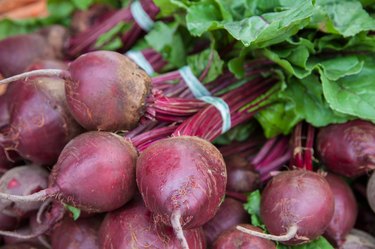
Irritated bowels -- more commonly known as irritable bowel syndrome -- are considered a functional gastrointestinal disorder. This means the symptoms of IBS affect how your GI tract works, but there's no intestinal damage. Certain foods, namely those high in dietary fiber, can help relieve the symptoms of IBS and, with long-term dietary changes, can provide consistent relief from the pain and difficulty of the disorder.
Symptoms of IBS
Video of the Day
Common symptoms of IBS include constipation, diarrhea, gas, bloating and stomach pain. The final three symptoms are common regardless of the type of IBS you have. There are four subtypes of IBS, which are diagnosed based on the frequency of the symptoms. IBS can be predominately constipation-oriented, diarrhea-oriented, mixed -- with constipation and diarrhea more than a quarter of the time each -- or unsubtyped, when both constipation and diarrhea occur less than 25 percent of the time.
Video of the Day
Food Recommendations
Recommendations for treating IBS are high-fiber foods, such as vegetables, legumes and whole grains. Including more vegetables -- such as carrots, spinach, lettuce, asparagus, beets, mushrooms, sweet potatoes and broccoli -- will help increase your dietary fiber intake. Juices made with a blender will contain all of the dietary fiber from vegetables. Fruits, such as apples, bananas, peaches and pears, as well as dried fruits, are also high in dietary fiber. For whole grains, whole-wheat bread and pasta, brown rice and oatmeal are good choices, as is popcorn. Gradually increase your fiber consumption, as eating too much too quickly can cause more of the symptoms you're trying to avoid: gas, bloating and constipation. If you suffer IBS flare-ups with diarrhea, eating starchy, lower-fiber foods for a short time may help. Try rice, potatoes, crackers and pasta, then ease back into a high-fiber diet.
Dietary Fiber
Dietary fiber is the part of plants that is indigestible by your digestive enzymes. Diets high in dietary fiber have a number of health benefits. In addition to reducing and preventing constipation and diarrhea, dietary fiber also helps you feel fuller faster, can help lower cholesterol levels and reduces the risk of heart disease. Most Americans do not eat enough dietary fiber, according to the University of Maryland Medical Center. The recommended dietary intake of fiber is 20 to 35 grams per day. Whole grains, legumes, vegetables and fruit are all naturally high in dietary fiber.
Insoluble and Soluble Fiber
There are two types of dietary fiber, soluble and insoluble. Soluble fiber is found within plant cells and mixes with fluid to create a gel that slows down the passage of food in your system. It also makes stools softer and easier to pass, thus helping with both constipation and diarrhea. Insoluble fiber does not mix with fluids and passes through undigested, making stools bulkier and speeding up the passage of waste. Insoluble fiber, found in the plant's cell walls, aids in relieving constipation.